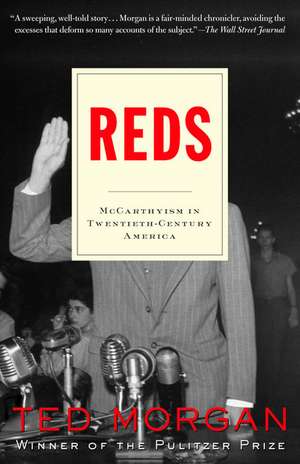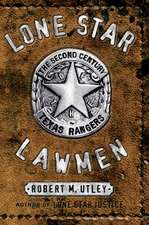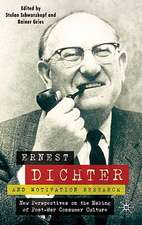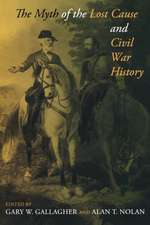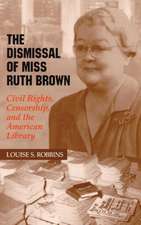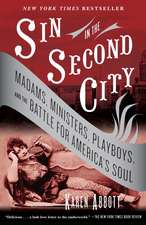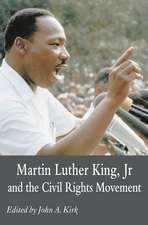Reds: McCarthyism in Twentieth-Century America
Autor Ted Morganen Limba Engleză Paperback – 31 oct 2004
In 1918, America invaded Russia in an attempt at regime change. Meanwhile, on the home front, the first of many congressional investigations of Communism was conducted. Anarchist bombs exploded from coast to coast, leading to the political repression of the Red Scare.
Soviet subversion and espionage in the United States began in 1920, under the cover of a trade mission. Franklin Delano Roosevelt granted the Soviets diplomatic recognition in 1933, which gave them an opportunity to expand their spy networks by using their embassy and consulates as espionage hubs. Simultaneously, the American Communist Party provided a recruitment pool for homegrown spies. Martin Dies, Jr., the first congressman to make his name as a Red hunter, developed solid information on Communist subversion through his Un-American Activities Committee. However, its hearings were marred by partisan attacks on the New Deal, presaging McCarthy.
The most pervasive period of Soviet espionage came during World War II, when Russia, as an ally of the United States, received military equipment financed under the policy of lend-lease. It was then that highly placed spies operated inside the U.S. government and in America’s nuclear facilities. Thanks to the Venona transcripts of KGB cable traffic, we now have a detailed account of wartime Soviet espionage, down to the marital problems of Soviet spies and the KGB’s abject efforts to capture deserting Soviet seamen on American soil.
During the Truman years, Soviet espionage was in disarray following the defections of Elizabeth Bentley and Igor Gouzenko. The American Communist Party was much diminished by a number of measures, including its expulsion from the labor unions, the prosecution of its leaders under the Smith Act, and the weeding out, under Truman’s loyalty program, of subversives in government. As Morgan persuasively establishes, by the time McCarthy exploited the Red issue in 1950, the battle against Communists had been all but won by the Truman administration.
In this bold narrative history, Ted Morgan analyzes the paradoxical culture of fear that seized a nation at the height of its power. Using Joseph McCarthy’s previously unavailable private papers and recently released transcripts of closed hearings of McCarthy’s investigations subcommittee, Morgan provides many new insights into the notorious Red hunter’s methods and motives.
Full of drama and intrigue, finely etched portraits, and political revelations, Reds brings to life a critical period in American history that has profound relevance to our own time.
From the Hardcover edition.
Preț: 143.70 lei
Nou
Puncte Express: 216
Preț estimativ în valută:
27.51€ • 29.89$ • 23.12£
27.51€ • 29.89$ • 23.12£
Carte disponibilă
Livrare economică 31 martie-14 aprilie
Preluare comenzi: 021 569.72.76
Specificații
ISBN-13: 9780812973020
ISBN-10: 081297302X
Pagini: 704
Dimensiuni: 133 x 203 x 38 mm
Greutate: 0.49 kg
Ediția:Rh Trade PB.
Editura: Random House Trade
ISBN-10: 081297302X
Pagini: 704
Dimensiuni: 133 x 203 x 38 mm
Greutate: 0.49 kg
Ediția:Rh Trade PB.
Editura: Random House Trade
Notă biografică
Ted Morgan is the author of FDR; Churchill, a finalist for the Pulitzer Prize; Somerset Maugham, a finalist for the National Book Award; and two epic narrative histories of America, Wilderness at Dawn: The Settling of the North American Continent and A Shovel of Stars: The Making of the American West—1800 to the Present. He lives in New York.
From the Hardcover edition.
From the Hardcover edition.
Extras
I
The Russian Revolution Through American Eyes
On July 30, 1914, posters went up in Russian cities ordering reservists from the ages of nineteen to forty-three to report to their barracks. Czar Nicholas II had promised his French allies that he would attack Germany with 800,000 men if war broke out, drawing enemy divisions to an eastern front. The Czar presided over a population of 180 million that was 80 percent illiterate, in a nation four times the size of the United States, stretching five thousand miles from Europe and the Baltic Sea to Asia and the Pacific. He ran his domain like a private and gated estate.
To farms where no word came more distant than that of the nearest market town, the mail brought a summons for the peasant to appear “with his riding horse.” The defense of the fatherland had a resonance that was instinctively obeyed, and hastily formed divisions trooped to the front from the eastern isolation of Siberia, from the banks of the Volga, from the steppes of Turkestan, the men wearing steel helmets and shouldering rifles with long bayonets. Russian commanders designated their units as so many bayonets.
By October, more than four million men were under arms, but it was the nineteenth century fighting the twentieth, Cossack horses and outdated maps against mechanized armies with telegraph and telephone, rifles against machine guns—and when the ammunition ran out, bayonets against machine guns, the officers leading the charge with drawn swords, as they had against Napoleon in 1812.
And yet, only Russia among the Allies fought the Central Powers on their own soil, invading East Prussia in August, and suffering severe losses. With a seemingly inexhaustible supply of reserves, the Russians were willing to mount offensives on demand, tying up German and Austrian troops and taking 2,700,000 prisoners. Marshal Ferdinand Foch later said: “If France was not wiped off the map of Europe, we owe it first to Russia.”
By March 1915, 200,000 new recruits a month were being mobilized, while fifty thousand rifles came off the production lines. The stories of unarmed Russian infantrymen waiting for the weapon of a fallen comrade were not German propaganda, but the demoralizing truth.
On September 1, 1915, after the Russians had retreated from Poland, the Czar himself took command, determined as a matter of personal pride not to lose face before the Allies. With 11 million men in the ranks, and four million more to be called up in 1916 and 1917, Russia could fight on. But Russia was bleeding, not only on the battlefield but on the home front. Those millions of men had to be fed, as did tens of thousands of horses using up tons of fodder. Priority for the army meant severe shortages of food and fuel on the home front.
Every war has its profiteers, who nibble rodentlike around the edges of events and don’t much care what side they are on so long as they get paid. Such a man was Alexander Helphand, a Russian-born adventurer who began his career as a Socialist journalist in Germany at the turn of the century, writing under the pen name “Parvus.”
In 1900, Helphand was operating an illegal press in a suburb of Munich, one of the European centers for Russian revolutionaries in exile. A leading firebrand, the thirty-year-old lawyer Vladimir Ilich Ulyanov, had recently finished a three-year term of exile in Siberia, and had taken to calling himself Ilyin or Lenin. Helphand agreed to print Lenin’s newspaper, Iskra (The Spark), which was distributed illegally in Russia.
Caught up in Lenin’s cause, Helphand took part in the failed revolution of 1905, and was arrested and sent to Siberia. In exile, his revolutionary fervor dimmed. Escaping to Turkey, he went into the import-export business and made a fortune. His only interest now was self-interest, but he maintained his radical contacts in the hope that a new regime in Russia would bring him some advantage.
On January 9, 1915, the German ambassador to Constantinople, H. Wangenheim, reported to Berlin that he had been approached by a Dr. Alexander Helphand, who was “definitely pro-German” and who advocated “the total destruction of czarism and the division of Russia into smaller states.” Germany would be successful, said Helphand, if it “kindled a major revolution in Russia. . . . The interests of the German government were therefore identical with those of the Russian revolutionaries.” Helphand offered to organize the rising but would need considerable sums of money and wanted to present his plan to Berlin.
The Germans were willing to consider any plan to destabilize Russia and take her out of the war. Helphand was summoned to Berlin on March 6. He saw Kurt Reizler, an aide of Chancellor Theobald Bethmann-Hollweg, to whom he gave an eighteen-page memorandum entitled “Preparations for Mass Political Strikes in Russia.” Helphand proposed that the Germans subsidize a splinter group of the Social Democratic Worker’s Party, who called themselves “The Majority” (Bolsheviks), and whose leader, Lenin, lived in Switzerland in exile. His plan was quickly approved: the next day Arthur Zimmerman, an undersecretary in the Foreign Ministry, asked the Treasury for 2 million marks to fund Russian revolutionary propaganda, half of which was turned over to Helphand.
In May 1915, Helphand went to Bern to discuss with Lenin the prospects for a revolution in Russia. Lenin was at first receptive to the plan, for his own slogan at the time was “transform the imperialist war into a civil war.” He blamed the war on giant banks and “surplus capitalism”; it was but a convulsion of the corrupt bourgeois state. When he saw his old friend, Lenin was dismayed by his appearance, for with his bloated face and heavy paunch over stumpy legs, Helphand seemed the very caricature of an imperialist banker. Lenin learned from those in Helphand’s entourage that the man he had known as a revolutionary was now a shameless displayer of wealth, staying at the best hotel, drinking champagne for breakfast, and surrounded by a retinue of pretty young women. It seemed more than likely that he was getting his money from the Germans. Any connection with the Germans would be fatal for Lenin, who would be accused of being in their employ.
Lenin decided to keep his distance from Helphand, who with his secret funds had launched a paper in Berlin called Die Glocke (The Bell), which followed the Foreign Ministry line. He wrote that Die Glocke was “an organ of renegades and dirty lackeys surrounding the cesspool of German chauvinism.”
In any event, Helphand’s account of his meeting with Lenin must have sounded encouraging, for on July 6 the German Foreign Secretary, Gottlieb von Jagow, asked the Treasury for 5 million marks to promote propaganda in Russia. In August, Helphand moved to Copenhagen, where a branch of his firm was located and where he had his most devoted admirer, the German envoy, Count Ulrich Brockdorff-Rantzau. It was said that Helphand practically dictated the envoy’s cables to Berlin. On August 14, 1915, Brockdorff-Rantzau gave him a ringing endorsement, reporting that Helphand was “an extraordinarily important man whose unusual powers I feel we must employ for the duration of the war.”
Helphand was by no means the only German spy on the Bolshevik beat. The Germans were particularly active in neutral countries like Sweden and Switzerland. In Stockholm, their chief agent was an Estonian nationalist, Alexander Keskula, who hoped that with the breakup of the Russian empire his small Baltic country would gain its independence.
Among Keskula’s multiple operations was an office at the Stockholm railroad station where he explained to Russians coming home from the United States and Canada how they could avoid mobilization in the Czar’s army. He also recruited Russian revolutionaries living in Sweden to write defeatist pamphlets that were smuggled into Russia after being printed on his press. One of his efforts was a picture book describing the excellent treatment afforded by the Germans to Russian prisoners of war. It was intended for distribution in the Russian trenches and included photographs of grinning Cossacks eating sauerkraut and bratwurst.
Keskula was on friendly terms with Lenin, and sent him copies of the pamphlets he was preparing for Russian barracks, calling for mutinies. Lenin in turn sent Keskula the situation reports he was getting from his people in Russia, which Keskula passed on to his control on the German General Staff in Berlin, an intelligence officer named Steinwachs. All this activity took money, and Steinwachs paid Keskula 20,000 marks a month.
On September 30, 1915, Keskula went to Bern to see Lenin, who listed the conditions under which he would be prepared to make a separate peace with Germany if his revolution succeeded. This fanciful manifesto included Russian troops liberating India from English imperialism, though he also announced his intention to confiscate large landholdings. Lenin’s willingness to sign a separate peace was uppermost in the mind of the German envoy in Bern, Baron Gisbert von Romberg, when he sent a long and astonishing dispatch to Berlin, stating that “in Keskula’s opinion, it is therefore essential that we should spring to the help of the revolutionaries of Lenin’s movement at once. . . . He will report on this matter in person in Berlin. According to his informants, the present moment should be favorable for overthrowing [Russia’s] government.” Thus from two sources, Helphand and Keskula, Berlin was getting the same advice: back the Bolsheviks.
On December 26, 1915, the German Foreign Ministry authorized 1 million rubles for Helphand, to be paid by the legation cashier in Copenhagen. On January 23, Helphand reported that the rubles had been smuggled into Petrograd (St. Petersburg). The money would be used to launch a series of strikes, but he now preferred to delay the uprising, for there was talk of deposing the Czar. At this point, because of the delay, Foreign Secretary von Jagow lost patience with Helphand and concluded he was a fake, possibly pocketing Treasury funds; Helphand found himself out in the cold. An accidental alliance of opportunists, Baltic nationalists, and Leninists had coalesced around the idea of a Russian revolution. The German Treasury was funding them, so far with little to show for it, and Lenin was stranded in Switzerland, with no hope of return to Russia.
In the fall of 1916, von Jagow resigned as Foreign Secretary in protest against the resumption of the unrestricted submarine warfare that would bring the United States into the war the following April. His successor was Arthur Zimmerman, a man given to bold policy initiatives. He was the author of the telegram that bears his name, inviting Mexico to enter into an alliance with Germany against the United States in exchange for which she would regain “her lost territory in Texas, New Mexico, and Arizona.” Intercepted and decoded by the British, the Zimmerman telegram was published in March 1917 by President Woodrow Wilson and helped prepare American opinion for U.S. entry into the war. Zimmerman was also strongly in favor of the Bolshevik strategy to shut down the Eastern Front, which to some in the Foreign Ministry seemed as farfetched as the offer to Mexico.
In the end, events in Russia had a momentum of their own. Rasputin, the Czarina’s sinister adviser, who was suspected of plotting to make peace with Germany, was murdered in December 1916. Food shortages a month later in Petrograd brought thousands to the streets, demanding bread and breaking shop windows, in what became known as the February Revolution.
William Chapin Huntington, the commercial attaché at the American embassy, witnessed the riots without surprise. The food situation was so acute, he reported, that people were living on herring and apples and vobla, fish dried in the sun that stank to high heaven. Vobla used to be a swear word, but now it was lunch. One of the translators at the embassy had seen a woman sitting on the pavement quietly lie down and die, without a groan. The Cossacks were ordered out against the rioters. Formerly they would have drawn their weapons and fired but now they rode up and down the sidewalks in silence.
Huntington was able to observe the decisive moment when the czarist regime fell. As the troops faced the crowd, there was a flicker of hesitation when a soldier had to decide whether to fire on his countrymen—and in that fraction of a second, the men in the barracks sided with the rioters and turned against their own ruler.
Out of the Petrograd riots came the Czar’s abdication and the formation of a provisional government. Nicholas II was urged to withdraw so that he would not be an impediment to the pursuit of the war. A delegation of members of the Duma, the Russian parliament, went to see him in the city of Pskov, 150 miles south of Petrograd, on March 15, 1917. “My abdication is necessary,” the Czar wrote in his diary in the early hours of the next morning, “for the sake of . . . maintaining calm in the army at the front. . . . All around is betrayal, cowardice and deceit.” And though he could not know it then, fifteen months away, death in a cellar by firing squad, at age fifty, with his wife and children.
In the chaotic days after the Czar’s abdication, when the Provisional Government was formed, its outstanding figure was Alexander Kerensky, who was named Minister of War and Justice, and in July, Prime Minister. As a young Socialist lawyer, Kerensky had been the fiery defender of revolutionaries, but once elected to the Duma in 1912 he calmed down. He backed the policy of joining the Allies, but became disgusted with the regime’s conduct of the war and urged its dissolution. In a time of extremes, Kerensky was caught in the classic dilemma of the moderate leader, the conductor whose only purpose is to keep the train on the tracks.
He had to contend not only with factions inside the government, but with a countergovernment in the rise of the soviets, which started out as a kind of Russian town hall, an outlet of the disenfranchised for all the piled-up grievances of generations. The Petrograd Soviet of Workers and Soldiers elected one deputy per thousand workers and per military company, who supposedly expressed the popular will, with infusions of agitprop from the Bolshevik minority, which eventually took it over. The soviets thus became the vehicle through which the Bolsheviks overthrew the Provisional Government, which one historian described as “responsibility without power confronting power without responsibility.”
The Petrograd Soviet set up its own Military Section, which infiltrated the Petrograd garrison of 150,000 and drew up the infamous Order No. 1, broadcast to the troops at the front and designed to destabilize the army. The order abolished the death penalty for desertion, demoted all officers to the rank of soldiers, and called for the election of soldiers to committees, which then proceeded to elect their officers. Committee meetings took the place of military discipline.
Kerensky did what he could, purging the high command and bringing in the excellent general A. A. Brusilov, who had won some important battles in 1916, as commander in chief. He sent commissars to the front to whip up offensive spirit in units where Bolshevik agitators preached defeatism. Officers who refused to take up advance positions were court-martialed. The goal of the Provisional Government was clearly expressed—to keep fighting the Germans.
From the Hardcover edition.
The Russian Revolution Through American Eyes
On July 30, 1914, posters went up in Russian cities ordering reservists from the ages of nineteen to forty-three to report to their barracks. Czar Nicholas II had promised his French allies that he would attack Germany with 800,000 men if war broke out, drawing enemy divisions to an eastern front. The Czar presided over a population of 180 million that was 80 percent illiterate, in a nation four times the size of the United States, stretching five thousand miles from Europe and the Baltic Sea to Asia and the Pacific. He ran his domain like a private and gated estate.
To farms where no word came more distant than that of the nearest market town, the mail brought a summons for the peasant to appear “with his riding horse.” The defense of the fatherland had a resonance that was instinctively obeyed, and hastily formed divisions trooped to the front from the eastern isolation of Siberia, from the banks of the Volga, from the steppes of Turkestan, the men wearing steel helmets and shouldering rifles with long bayonets. Russian commanders designated their units as so many bayonets.
By October, more than four million men were under arms, but it was the nineteenth century fighting the twentieth, Cossack horses and outdated maps against mechanized armies with telegraph and telephone, rifles against machine guns—and when the ammunition ran out, bayonets against machine guns, the officers leading the charge with drawn swords, as they had against Napoleon in 1812.
And yet, only Russia among the Allies fought the Central Powers on their own soil, invading East Prussia in August, and suffering severe losses. With a seemingly inexhaustible supply of reserves, the Russians were willing to mount offensives on demand, tying up German and Austrian troops and taking 2,700,000 prisoners. Marshal Ferdinand Foch later said: “If France was not wiped off the map of Europe, we owe it first to Russia.”
By March 1915, 200,000 new recruits a month were being mobilized, while fifty thousand rifles came off the production lines. The stories of unarmed Russian infantrymen waiting for the weapon of a fallen comrade were not German propaganda, but the demoralizing truth.
On September 1, 1915, after the Russians had retreated from Poland, the Czar himself took command, determined as a matter of personal pride not to lose face before the Allies. With 11 million men in the ranks, and four million more to be called up in 1916 and 1917, Russia could fight on. But Russia was bleeding, not only on the battlefield but on the home front. Those millions of men had to be fed, as did tens of thousands of horses using up tons of fodder. Priority for the army meant severe shortages of food and fuel on the home front.
Every war has its profiteers, who nibble rodentlike around the edges of events and don’t much care what side they are on so long as they get paid. Such a man was Alexander Helphand, a Russian-born adventurer who began his career as a Socialist journalist in Germany at the turn of the century, writing under the pen name “Parvus.”
In 1900, Helphand was operating an illegal press in a suburb of Munich, one of the European centers for Russian revolutionaries in exile. A leading firebrand, the thirty-year-old lawyer Vladimir Ilich Ulyanov, had recently finished a three-year term of exile in Siberia, and had taken to calling himself Ilyin or Lenin. Helphand agreed to print Lenin’s newspaper, Iskra (The Spark), which was distributed illegally in Russia.
Caught up in Lenin’s cause, Helphand took part in the failed revolution of 1905, and was arrested and sent to Siberia. In exile, his revolutionary fervor dimmed. Escaping to Turkey, he went into the import-export business and made a fortune. His only interest now was self-interest, but he maintained his radical contacts in the hope that a new regime in Russia would bring him some advantage.
On January 9, 1915, the German ambassador to Constantinople, H. Wangenheim, reported to Berlin that he had been approached by a Dr. Alexander Helphand, who was “definitely pro-German” and who advocated “the total destruction of czarism and the division of Russia into smaller states.” Germany would be successful, said Helphand, if it “kindled a major revolution in Russia. . . . The interests of the German government were therefore identical with those of the Russian revolutionaries.” Helphand offered to organize the rising but would need considerable sums of money and wanted to present his plan to Berlin.
The Germans were willing to consider any plan to destabilize Russia and take her out of the war. Helphand was summoned to Berlin on March 6. He saw Kurt Reizler, an aide of Chancellor Theobald Bethmann-Hollweg, to whom he gave an eighteen-page memorandum entitled “Preparations for Mass Political Strikes in Russia.” Helphand proposed that the Germans subsidize a splinter group of the Social Democratic Worker’s Party, who called themselves “The Majority” (Bolsheviks), and whose leader, Lenin, lived in Switzerland in exile. His plan was quickly approved: the next day Arthur Zimmerman, an undersecretary in the Foreign Ministry, asked the Treasury for 2 million marks to fund Russian revolutionary propaganda, half of which was turned over to Helphand.
In May 1915, Helphand went to Bern to discuss with Lenin the prospects for a revolution in Russia. Lenin was at first receptive to the plan, for his own slogan at the time was “transform the imperialist war into a civil war.” He blamed the war on giant banks and “surplus capitalism”; it was but a convulsion of the corrupt bourgeois state. When he saw his old friend, Lenin was dismayed by his appearance, for with his bloated face and heavy paunch over stumpy legs, Helphand seemed the very caricature of an imperialist banker. Lenin learned from those in Helphand’s entourage that the man he had known as a revolutionary was now a shameless displayer of wealth, staying at the best hotel, drinking champagne for breakfast, and surrounded by a retinue of pretty young women. It seemed more than likely that he was getting his money from the Germans. Any connection with the Germans would be fatal for Lenin, who would be accused of being in their employ.
Lenin decided to keep his distance from Helphand, who with his secret funds had launched a paper in Berlin called Die Glocke (The Bell), which followed the Foreign Ministry line. He wrote that Die Glocke was “an organ of renegades and dirty lackeys surrounding the cesspool of German chauvinism.”
In any event, Helphand’s account of his meeting with Lenin must have sounded encouraging, for on July 6 the German Foreign Secretary, Gottlieb von Jagow, asked the Treasury for 5 million marks to promote propaganda in Russia. In August, Helphand moved to Copenhagen, where a branch of his firm was located and where he had his most devoted admirer, the German envoy, Count Ulrich Brockdorff-Rantzau. It was said that Helphand practically dictated the envoy’s cables to Berlin. On August 14, 1915, Brockdorff-Rantzau gave him a ringing endorsement, reporting that Helphand was “an extraordinarily important man whose unusual powers I feel we must employ for the duration of the war.”
Helphand was by no means the only German spy on the Bolshevik beat. The Germans were particularly active in neutral countries like Sweden and Switzerland. In Stockholm, their chief agent was an Estonian nationalist, Alexander Keskula, who hoped that with the breakup of the Russian empire his small Baltic country would gain its independence.
Among Keskula’s multiple operations was an office at the Stockholm railroad station where he explained to Russians coming home from the United States and Canada how they could avoid mobilization in the Czar’s army. He also recruited Russian revolutionaries living in Sweden to write defeatist pamphlets that were smuggled into Russia after being printed on his press. One of his efforts was a picture book describing the excellent treatment afforded by the Germans to Russian prisoners of war. It was intended for distribution in the Russian trenches and included photographs of grinning Cossacks eating sauerkraut and bratwurst.
Keskula was on friendly terms with Lenin, and sent him copies of the pamphlets he was preparing for Russian barracks, calling for mutinies. Lenin in turn sent Keskula the situation reports he was getting from his people in Russia, which Keskula passed on to his control on the German General Staff in Berlin, an intelligence officer named Steinwachs. All this activity took money, and Steinwachs paid Keskula 20,000 marks a month.
On September 30, 1915, Keskula went to Bern to see Lenin, who listed the conditions under which he would be prepared to make a separate peace with Germany if his revolution succeeded. This fanciful manifesto included Russian troops liberating India from English imperialism, though he also announced his intention to confiscate large landholdings. Lenin’s willingness to sign a separate peace was uppermost in the mind of the German envoy in Bern, Baron Gisbert von Romberg, when he sent a long and astonishing dispatch to Berlin, stating that “in Keskula’s opinion, it is therefore essential that we should spring to the help of the revolutionaries of Lenin’s movement at once. . . . He will report on this matter in person in Berlin. According to his informants, the present moment should be favorable for overthrowing [Russia’s] government.” Thus from two sources, Helphand and Keskula, Berlin was getting the same advice: back the Bolsheviks.
On December 26, 1915, the German Foreign Ministry authorized 1 million rubles for Helphand, to be paid by the legation cashier in Copenhagen. On January 23, Helphand reported that the rubles had been smuggled into Petrograd (St. Petersburg). The money would be used to launch a series of strikes, but he now preferred to delay the uprising, for there was talk of deposing the Czar. At this point, because of the delay, Foreign Secretary von Jagow lost patience with Helphand and concluded he was a fake, possibly pocketing Treasury funds; Helphand found himself out in the cold. An accidental alliance of opportunists, Baltic nationalists, and Leninists had coalesced around the idea of a Russian revolution. The German Treasury was funding them, so far with little to show for it, and Lenin was stranded in Switzerland, with no hope of return to Russia.
In the fall of 1916, von Jagow resigned as Foreign Secretary in protest against the resumption of the unrestricted submarine warfare that would bring the United States into the war the following April. His successor was Arthur Zimmerman, a man given to bold policy initiatives. He was the author of the telegram that bears his name, inviting Mexico to enter into an alliance with Germany against the United States in exchange for which she would regain “her lost territory in Texas, New Mexico, and Arizona.” Intercepted and decoded by the British, the Zimmerman telegram was published in March 1917 by President Woodrow Wilson and helped prepare American opinion for U.S. entry into the war. Zimmerman was also strongly in favor of the Bolshevik strategy to shut down the Eastern Front, which to some in the Foreign Ministry seemed as farfetched as the offer to Mexico.
In the end, events in Russia had a momentum of their own. Rasputin, the Czarina’s sinister adviser, who was suspected of plotting to make peace with Germany, was murdered in December 1916. Food shortages a month later in Petrograd brought thousands to the streets, demanding bread and breaking shop windows, in what became known as the February Revolution.
William Chapin Huntington, the commercial attaché at the American embassy, witnessed the riots without surprise. The food situation was so acute, he reported, that people were living on herring and apples and vobla, fish dried in the sun that stank to high heaven. Vobla used to be a swear word, but now it was lunch. One of the translators at the embassy had seen a woman sitting on the pavement quietly lie down and die, without a groan. The Cossacks were ordered out against the rioters. Formerly they would have drawn their weapons and fired but now they rode up and down the sidewalks in silence.
Huntington was able to observe the decisive moment when the czarist regime fell. As the troops faced the crowd, there was a flicker of hesitation when a soldier had to decide whether to fire on his countrymen—and in that fraction of a second, the men in the barracks sided with the rioters and turned against their own ruler.
Out of the Petrograd riots came the Czar’s abdication and the formation of a provisional government. Nicholas II was urged to withdraw so that he would not be an impediment to the pursuit of the war. A delegation of members of the Duma, the Russian parliament, went to see him in the city of Pskov, 150 miles south of Petrograd, on March 15, 1917. “My abdication is necessary,” the Czar wrote in his diary in the early hours of the next morning, “for the sake of . . . maintaining calm in the army at the front. . . . All around is betrayal, cowardice and deceit.” And though he could not know it then, fifteen months away, death in a cellar by firing squad, at age fifty, with his wife and children.
In the chaotic days after the Czar’s abdication, when the Provisional Government was formed, its outstanding figure was Alexander Kerensky, who was named Minister of War and Justice, and in July, Prime Minister. As a young Socialist lawyer, Kerensky had been the fiery defender of revolutionaries, but once elected to the Duma in 1912 he calmed down. He backed the policy of joining the Allies, but became disgusted with the regime’s conduct of the war and urged its dissolution. In a time of extremes, Kerensky was caught in the classic dilemma of the moderate leader, the conductor whose only purpose is to keep the train on the tracks.
He had to contend not only with factions inside the government, but with a countergovernment in the rise of the soviets, which started out as a kind of Russian town hall, an outlet of the disenfranchised for all the piled-up grievances of generations. The Petrograd Soviet of Workers and Soldiers elected one deputy per thousand workers and per military company, who supposedly expressed the popular will, with infusions of agitprop from the Bolshevik minority, which eventually took it over. The soviets thus became the vehicle through which the Bolsheviks overthrew the Provisional Government, which one historian described as “responsibility without power confronting power without responsibility.”
The Petrograd Soviet set up its own Military Section, which infiltrated the Petrograd garrison of 150,000 and drew up the infamous Order No. 1, broadcast to the troops at the front and designed to destabilize the army. The order abolished the death penalty for desertion, demoted all officers to the rank of soldiers, and called for the election of soldiers to committees, which then proceeded to elect their officers. Committee meetings took the place of military discipline.
Kerensky did what he could, purging the high command and bringing in the excellent general A. A. Brusilov, who had won some important battles in 1916, as commander in chief. He sent commissars to the front to whip up offensive spirit in units where Bolshevik agitators preached defeatism. Officers who refused to take up advance positions were court-martialed. The goal of the Provisional Government was clearly expressed—to keep fighting the Germans.
From the Hardcover edition.
Recenzii
Praise for Pulitzer Prize–winning author Ted Morgan
A Covert Life: Jay Lovestone, Communist, Anti-Communist, and Spymaster
“A rich and detailed account . . . one of the most important and original books in many years about American politics, about the politics of communism in the middle decades of the century, and about the role of the CIA in the political struggles of the cold war. But Morgan’s book does not simply get all that straight; it is also a delight to read. . . . Morgan has a great talent for narrative.”
—Thomas Powers, The New York Review of Books
A Shovel of Stars: The Making of the American West—1800 to the Present
“An exhilarating collection of the experiences of Americans as they settled the West during the nineteenth century . . . Morgan keeps the reader’s attention on the individuals who shared the hardships and made successes of the long process.”
—James Benet, San Francisco Chronicle
Wilderness at Dawn: The Settling of the North American Continent
“Ted Morgan is a master storyteller.”
—Mary Beth Norton, The Washington Post Book World
From the Hardcover edition.
A Covert Life: Jay Lovestone, Communist, Anti-Communist, and Spymaster
“A rich and detailed account . . . one of the most important and original books in many years about American politics, about the politics of communism in the middle decades of the century, and about the role of the CIA in the political struggles of the cold war. But Morgan’s book does not simply get all that straight; it is also a delight to read. . . . Morgan has a great talent for narrative.”
—Thomas Powers, The New York Review of Books
A Shovel of Stars: The Making of the American West—1800 to the Present
“An exhilarating collection of the experiences of Americans as they settled the West during the nineteenth century . . . Morgan keeps the reader’s attention on the individuals who shared the hardships and made successes of the long process.”
—James Benet, San Francisco Chronicle
Wilderness at Dawn: The Settling of the North American Continent
“Ted Morgan is a master storyteller.”
—Mary Beth Norton, The Washington Post Book World
From the Hardcover edition.
